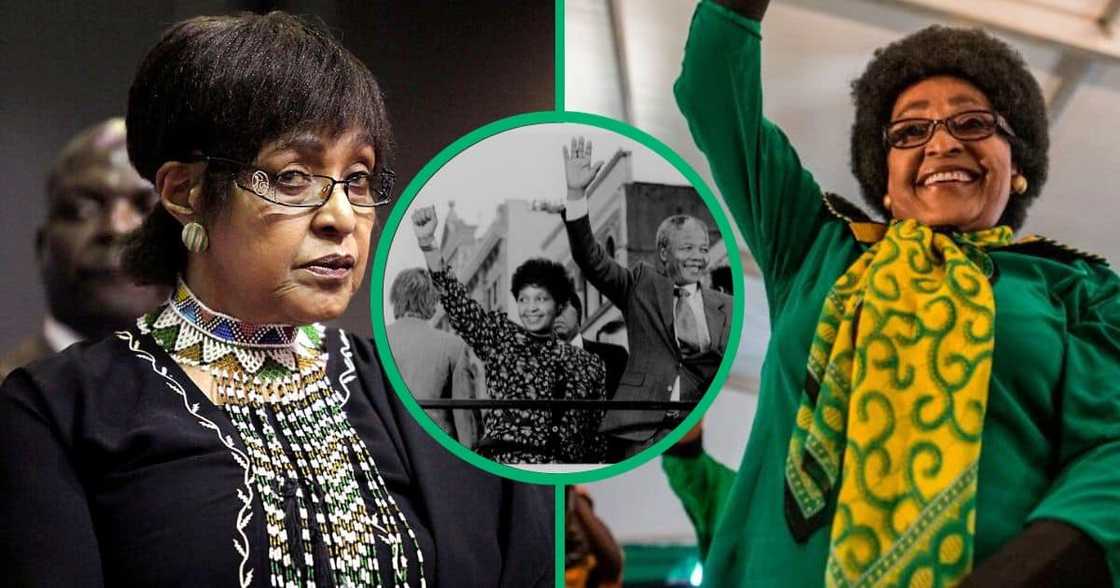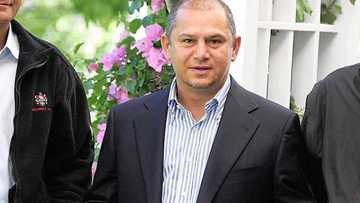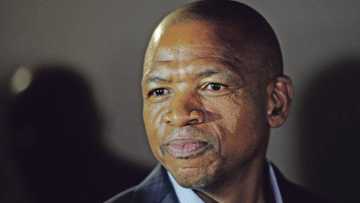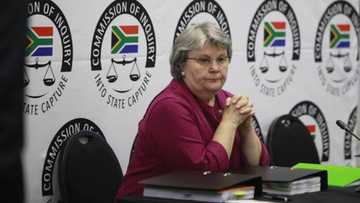The Real-Life Story of Winnie Madikizela-Mandela: From Adversity to a Global Icon
- Winnie Madikizela-Mandela was a South African anti-apartheid activist, a politician, and the second wife of the first black president of South Africa, Nelson Mandela
- In 1963, after Madiba was imprisoned for 27 years, Winnie became the international face of the anti-apartheid movement, where she endured pain and torture
- The family released a statement regarding her death in 2018, with many South Africans sharing their heartfelt condolences at the time

Source: Getty Images
Winnie Madikizela-Mandela holds a unique position in South African politics, both during her lifetime and after. This incredible woman was a stalwart of the African National Congress (ANC); however, she stood above the party and more.
Winnie Madikizela-Mandela's early life
Nomzamo Winifred Zanyiwe Madikizela was born on 26 September 1936 in a rural area of Bizana, Transkei, South Africa. Winnie eventually moved to the city of gold in Johannesburg in 1953 to study at the Jan Hofmeyr School of Social Work.
At the time, South Africa was under a system known as apartheid, where South African citizens endured a severe caste system while descendants of Europeans benefited from significantly greater levels of social freedom, wealth, and health.
PAY ATTENTION: Let yourself be inspired by real people who go beyond the ordinary! Subscribe and watch our new shows on Briefly TV Life now!
After completing her education, Winnie chose to serve as the first black medical social worker at Johannesburg's Baragwanath Hospital, despite being awarded a scholarship to study in America. As a committed practitioner, she became aware of the appalling conditions in which many of her patients resided through her fieldwork.
As time went by, Winnie went on to meet attorney Nelson Rolihlahla Mandela, who, at the time, was the leader of the African National Congress, an organisation with the goal of abolishing the apartheid racial segregation system in South Africa.
Madikizela-Mandela's life as a politician and her activism
Despite concerns from Winnie's father over the couple's age gap and Nelson's active political involvement, the two tied the knot in June 1958. Winnie moved into Nelson's Soweto house after the wedding, where the name Winnie Madikizela-Mandel was born.
During his early married life, Nelson was frequently detained for his actions and was singled out by the government. In 1964, he was eventually found guilty and given a life sentence, leaving Winnie to raise his two young girls, Zenani and Zindzi Mandela, alone.
Even then, Winnie committed herself to carrying out her mission of bringing an end to apartheid. She discreetly supported the ANC and sent her kids to boarding school in Swaziland in order to provide them with a more peaceful upbringing.
In her fight for an equal South Africa, Winnie was quoted as saying the following, according to News24:
"I will not allow the selfless efforts of my husband and his friends to be abandoned. I will continue the struggle for a free and equal South Africa."
Her activism extended beyond political circles, as she worked tirelessly to improve the lives of black South Africans, especially those living in impoverished townships.
During Nelson Mandela's long imprisonment, Winnie became the international face of the anti-apartheid movement. Her perseverance and determination to keep the flame of resistance alive garnered global support for the cause. Winnie's resilience in the face of adversity turned her into a symbol of hope for millions who yearned for a free and equal South Africa.
In her pursuit and drive for freedom and equality for South Africa, Winnie was placed under government surveillance, detained under the Terrorism Suppression Act, and subjected to abuse while held in solitary confinement for almost a year. She resumed her activities after being freed and went on to get arrested multiple times.
Winnie is dubbed 'Mother of the Nation'
Winnie returned to Soweto in 1985 following a firebombing of her home, where she persisted in denouncing the regime and solidified her reputation as the Mother of the Nation. She gained notoriety nonetheless for supporting lethal reprisals against black people who assisted the apartheid government.
After Nelson Mandela's release in 1990 and the end of apartheid in 1994, Winnie continued to be a prominent political figure. However, her legacy is not without controversy, as she faced criticism for her association with violence during the struggle and her involvement in legal issues. Despite these challenges, her contributions to the anti-apartheid movement and the eventual dismantling of apartheid remain undeniable.
Winnie went on to be elected president of the ANC Women's League, regardless of her conviction. Nelson then became the first black president of South Africa when he won the 1994 presidential election; Winnie was then appointed deputy minister of arts, culture, science, and technology. But in 1995, her husband removed her from her cabinet position because of her radical affiliations and rhetoric. The couple divorced in 1996 after only a few years together.
Mzansi mourns Winnie Madikizela-Mandela's death
After battling a long-lasting illness, Winnie passed away on 2 April 2018, in Johannesburg.
According to TimesLive a statement was released by the Mandela family’s spokesperson regarding Winnie’s death.
Taking to social media, many people paid tribute to Winnie Mandela:
@Makusagaya The Great said:
“Ali do you know that I personally help this beautiful woman fight some of injustice they did to her. Bdichazokupa hangu history yacho. She was a fighter. She was strong. And very stubborn. She couldn’t be moved by anything!”
@Yves Nsengiyumva shared:
“She lives in us. What a great leader she was!”
@Mbuyiseni Ndlozi added:
“But when do we recover from the pain of her loss? At what point does the heart accept that she is no more?
"Or do we live with the vacuum in the soul as a permanent feature of the heart? #WinnieMandela is the president we deserved! We‘ll pay a thousand years for rejecting her!”
SA celebrates renaming of William Nicole Drive in honour of Winnie Mandela
Earlier this year, Briefly News reported that the African National Congress (ANC) and Economic Freedom Fighters (EFF) supporters celebrated the renaming of William Nicol Drive in Johannesburg in honour of the late Winnie Madikizela-Mandela.
The renaming of the long stretch of road coincided with the apartheid stalwart's birthday on 26 September. Party members gathered in song and dance as the City of Johannesburg officially renamed the road.
Source: Briefly News






